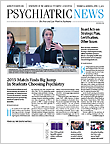Though studies have shown that antipsychotic medications are associated with increased mortality risk in older adults with dementia, little is known about such risk relative to no treatment or to alternative psychotropic therapies, according to researchers from the University of Michigan Health System.
“The harms associated with using antipsychotics in dementia patients are clear, yet clinicians continue to use them,” said the study’s lead author, Donovan Maust, M.D., M.S., an assistant professor of geriatric psychiatry.
Clinical trials and meta-analyses of research have suggested modest benefit from some antipsychotic agents over placebo for the treatment of psychosis and aggression in patients with dementia. These symptoms occur in more than 90 percent of affected patients, Maust said in a statement.
In 2005, the Food and Drug Administration issued a black-box warning indicating that the use of atyptical, or second-generation, antipsychotics lead to increased all-cause mortality when used to treat behavioral disturbances in patients with dementia. This was followed by a 2008 black-box warning for first-generation antipsychotics after additional analysis showed an even higher mortality risk for this category of medication.
Despite major risks associated with use of antipsychotics in older adults with dementia, these drugs are among the most widely prescribed in this vulnerable population, with approximately 1 in 7 elderly individuals with dementia—who are not in nursing homes—being prescribed such medications, according to data from the Government Accountability Office.
Because of the heightened risk for all-cause mortality and the high prevalence of antipsychotic use in elderly patients with dementia, Maust, along with senior author Helen Kales, M.D., a professor of psychiatry and director of the Program for Positive Aging, and colleagues decided to investigate if less-risky options exist to treat neuropsychiatric symptoms in this population.
The researchers analyzed health records of more than 90,500 individuals aged 65 and older with dementia to assess the risk for death in patients who received antipsychotics and to compare that risk with those who did not take these medications. They simplified the rate of risk for mortality by estimating how many elderly patients would have to be on a drug for one of them to die within six months, known as the “number needed to harm (NNH).”
The results, published online in JAMA Psychiatry on March 18, showed that mortality risks statistically increased in patients taking antipsychotics to reduce symptoms of dementia compared with individuals not being treated with the drugs. Haloperidol was linked with the highest level of risk—with one death per 26 individuals taking the drug. Risperidone had a NNH of 27, followed by olanzapine and quetiapine with NNHs of, respectively, 40 and 50. The risk increased with increasing antipsychotic dosage.
The researchers also evaluated the mortality risk for older adults with dementia who took antidepressants, representing alternative pharmacotherapies in the study. The mortality risks were lower—with one person dying for every 166 individuals taking these medications.
“Our research indicates that antipsychotics may increase mortality more than previously realized,” Kales told Psychiatric News. “We hope this creates a dialogue about the advantages and disadvantages of antipsychotic and other psychotropic use as first-line treatment strategies for behavioral symptoms, which are universal and require effective treatments to address serious suffering among patients, families, and caregivers.”
One first-line treatment strategy is the “DICE” approach, which emphasizes using nonpharmacological strategies first (Psychiatric News, October 10, 2014). “This approach takes more time than writing a prescription,” said Kales. “Nonpharmacologic approaches will succeed only if we as a society agree to pay front-line providers for the time needed to ‘do the right thing,’ ” she emphasized.
Kales, Maust, and colleagues indicated that they intend to continue studying the issue of mortality risk from the use of psychotropic drugs for dementia using other datasets.
The study was funded by the National Institute of Mental Health and the National Institute on Aging. ■
An abstract of “Antipsychotics, Other Psychotropics, and the Risk of Death in Patients With Dementia” can be accessed
here.

